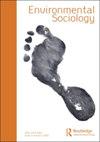Ecological Civilization in the making: the ‘construction’ of China’s climate-forestry nexus
IF 2.8
Q3 ENVIRONMENTAL STUDIES
引用次数: 5
Abstract
ABSTRACT In the Anthropocene, debates about global climate risks have taken carbon as a measure of policy success, with land-based mitigation strategies like afforestation receiving particular scrutiny. While scientists and policymakers discuss forestry as a potential climate solution, China has been implementing massive forestry projects for decades, drastically transforming environments under the Ecological Civilization framework. This article showcases China’s globally emerging paradigm of Eco-Civilization and its implications for the climate-forestry nexus. Drawing parallels with Ulrich Beck’s concept of ‘metamorphosis’ and Bruno Latour’s concept of ‘mutation,’ we argue that China’s Eco-Civilization aspires to a fundamental transformation in worldview – but one that is promoted as distinctly non-Western. We use the case of forestry to illuminate the potentially unique features of Chinese environmentalism as encapsulated in Eco-Civilization. We find that Eco-Civilization affords a strong role for the central state in actively building and constructing an ecological future in which the natural and the socio-political are not considered separate. This is in contrast to certain Western visions of preserving nature from human encroachment through grassroots environmental movements. We conclude by highlighting the theoretical contributions more pluralized debates about China’s environmental rise could bring to environmental sociology.正在形成的生态文明:中国气候-林业关系的“构建”
在人类世,关于全球气候风险的争论已经把碳作为政策成功的衡量标准,以土地为基础的缓解策略,如造林,受到特别的审查。当科学家和政策制定者讨论林业作为潜在的气候解决方案时,中国几十年来一直在实施大规模的林业项目,在生态文明框架下彻底改变了环境。本文展示了中国在全球兴起的生态文明范例及其对气候-林业关系的影响。与乌尔里希·贝克(Ulrich Beck)的“变形”(metamorphosis)概念和布鲁诺·拉图尔(Bruno Latour)的“突变”(mutation)概念相比较,我们认为,中国的生态文明渴望在世界观上发生根本性的转变——但这种转变被标榜为明显的非西方。我们以林业为例,阐明了中国生态文明所蕴含的环境保护主义的潜在独特特征。我们发现,在积极构建自然与社会政治不分离的生态未来方面,生态文明为中央政府提供了强大的作用。这与西方通过草根环保运动保护自然免受人类侵犯的某些愿景形成鲜明对比。最后,我们强调了关于中国环境崛起的多元化辩论可能给环境社会学带来的理论贡献。
本文章由计算机程序翻译,如有差异,请以英文原文为准。
求助全文
约1分钟内获得全文
求助全文
来源期刊

Environmental Sociology
ENVIRONMENTAL STUDIES-
CiteScore
4.60
自引率
12.00%
发文量
34
期刊介绍:
Environmental Sociology is dedicated to applying and advancing the sociological imagination in relation to a wide variety of environmental challenges, controversies and issues, at every level from the global to local, from ‘world culture’ to diverse local perspectives. As an international, peer-reviewed scholarly journal, Environmental Sociology aims to stretch the conceptual and theoretical boundaries of both environmental and mainstream sociology, to highlight the relevance of sociological research for environmental policy and management, to disseminate the results of sociological research, and to engage in productive dialogue and debate with other disciplines in the social, natural and ecological sciences. Contributions may utilize a variety of theoretical orientations including, but not restricted to: critical theory, cultural sociology, ecofeminism, ecological modernization, environmental justice, organizational sociology, political ecology, political economy, post-colonial studies, risk theory, social psychology, science and technology studies, globalization, world-systems analysis, and so on. Cross- and transdisciplinary contributions are welcome where they demonstrate a novel attempt to understand social-ecological relationships in a manner that engages with the core concerns of sociology in social relationships, institutions, practices and processes. All methodological approaches in the environmental social sciences – qualitative, quantitative, integrative, spatial, policy analysis, etc. – are welcomed. Environmental Sociology welcomes high-quality submissions from scholars around the world.
 求助内容:
求助内容: 应助结果提醒方式:
应助结果提醒方式:


